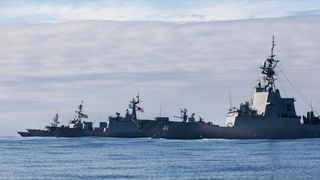While 2023 saw the largest investment in Australia’s military since the Second World War, Australians think war with China is less likely than in previous years, according to a new poll from the United States Studies Centre (USSC) at the University of Sydney.
In One year from the 2024 US presidential election: The stakes for Australia and the alliance, report authors Director of Research Jared Mondschein and Research Editor Victoria Cooper, with research associates Samuel Garrett and Ava Kalinauskas, found a nine per cent drop in the number of Australians who see conflict with China as very or somewhat likely.
Mondschein commented, “In 2022, 58 per cent of Australians said they saw conflict with China as somewhat or very likely, but in 2023 this was 49 per cent, one of the most surprising findings from our poll this year.”
Surveying publics in Australia, the United States and Japan, the researchers analysed opinion trends on issues spanning AUKUS and alliances to sensitive technology and Donald Trump and compared results both across countries and over time.
“In spite of the indictments and a tumultuous year for former president Donald Trump, this year, nine per cent fewer Australian respondents said a second Trump term would be very bad for Australia,” Cooper noted, adding, “With an increase in those who answered ‘don’t know’ or ‘neither good nor bad’, there seems to be a growing indifference to President Trump.”
Nearly half of Australian respondents said a second Trump term would be bad or very bad for Australia, but more Australians want to stay in their alliance with the United States than withdraw if he wins the 2024 election.
“What we saw this year was a tempering of some of the major upswings we saw in 2022, but even with a reduction in threats perceived in the region and concerns over the cost of AUKUS, sentiment towards alliances and AUKUS is still more favourable than not,” Mondschein concluded.
Hear report authors Jared Mondschein and Victoria Cooper discuss their latest findings in an episode of USSC Briefing Room.
Key findings
- Fewer Australians see conflict with China as likely; less than half of Australians say war with China is somewhat or very likely, down from 59 per cent in 2022.
- A majority of respondents believe that Chinese dominance in Asia would be bad for their countries. More than two-thirds (67 per cent) of Japanese respondents say that China being the most influential country in Asia would be bad for their country, followed by 57 per cent of Australians and 51 per cent of Americans.
- A majority of Australian (54 per cent) and Japanese (55 per cent) respondents continue to believe their US alliance makes them safer, albeit fewer Australians than last year (63 per cent).
- Japanese respondents (55 per cent) are nearly twice as positive as Australians (29 per cent) about whether the United States is helpful in Asia, even outpacing Americans’ self-perception (39 per cent). Interestingly, the perception that China is more helpful in Asia is more pronounced among younger Americans, with 31 per cent of 18–34 year old Americans saying China is mostly helpful and 26 percent saying it is mostly harmful. Only 14 percent of all Americans find China mostly helpful while 49 per cent said they are mostly harmful.
- Half of Australians support following the United States into armed conflict if a US ally like Japan is attacked — more than twice the percentage of Japanese respondents (24 per cent) who say they agree with following the United States into conflict if a US ally like Australia is attacked.
- Only small minorities (14–19 per cent) in all three nations think it is a bad idea for Australia to have nuclear-powered submarines.
- Some 60 per cent of Australians see AUKUS as a good idea that will create jobs but nearly half also think that it will lock Australia into supporting the United States in a conflict and 42 per cent say the submarines are not worth the cost.
- Australians hold more negative opinions (45 per cent) on a second Trump term than Japanese respondents (40 per cent), but both publics are increasingly unbothered by a second term for either leading candidate.
Media enquiries
USSC Media
T 0468 480 165
E ussc.media@sydney.edu.au





